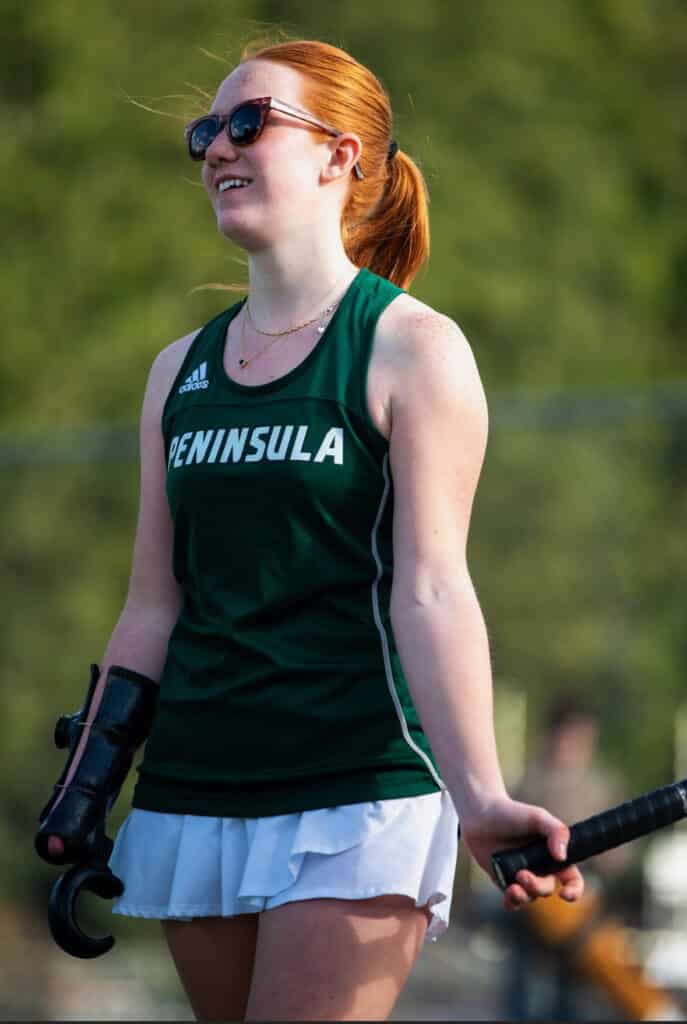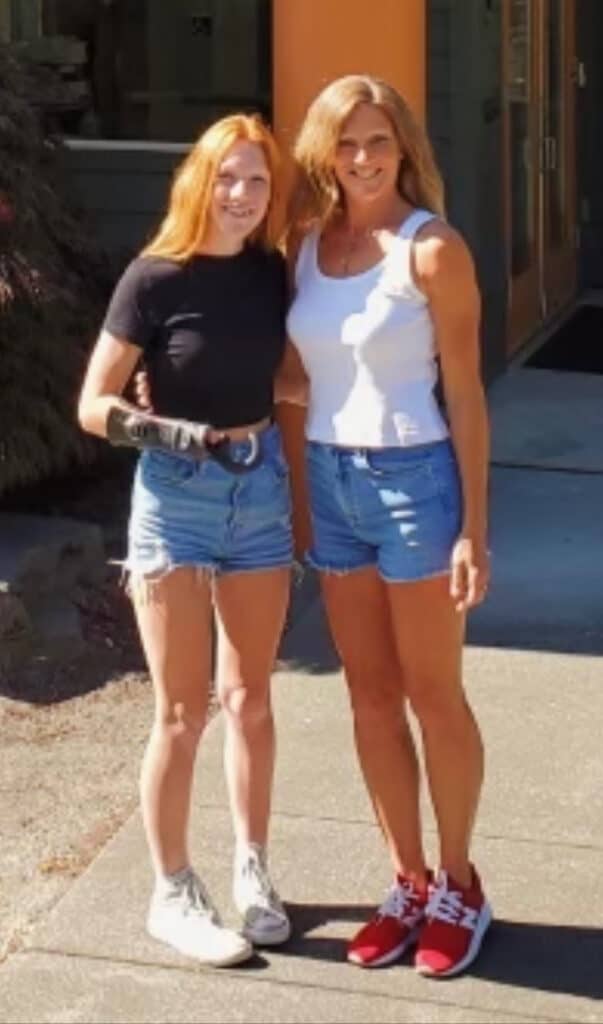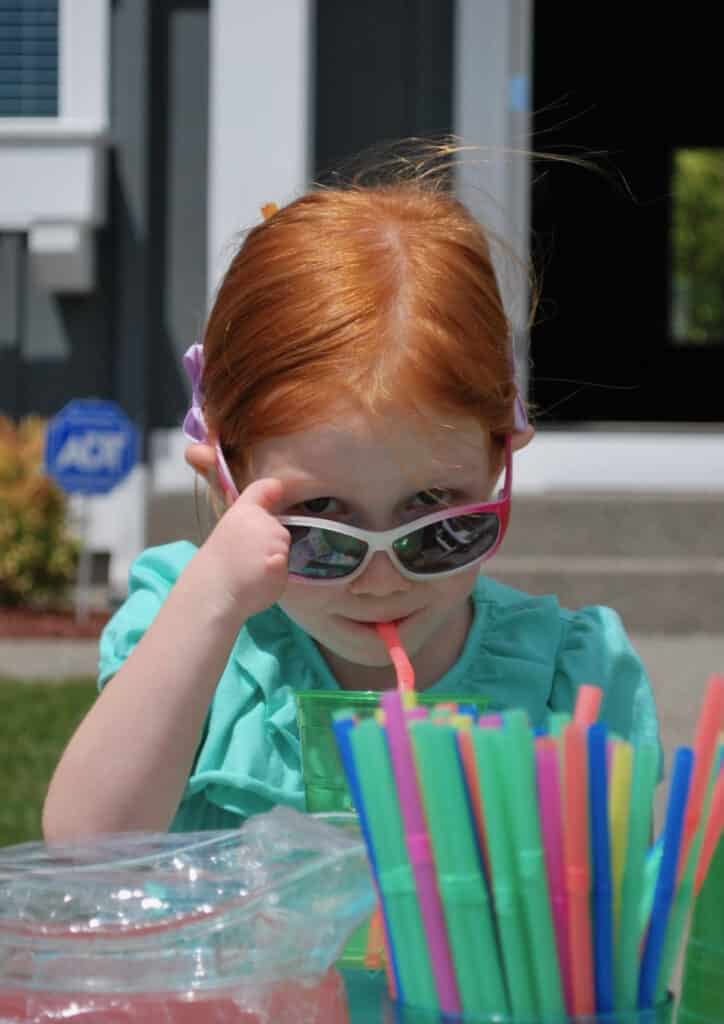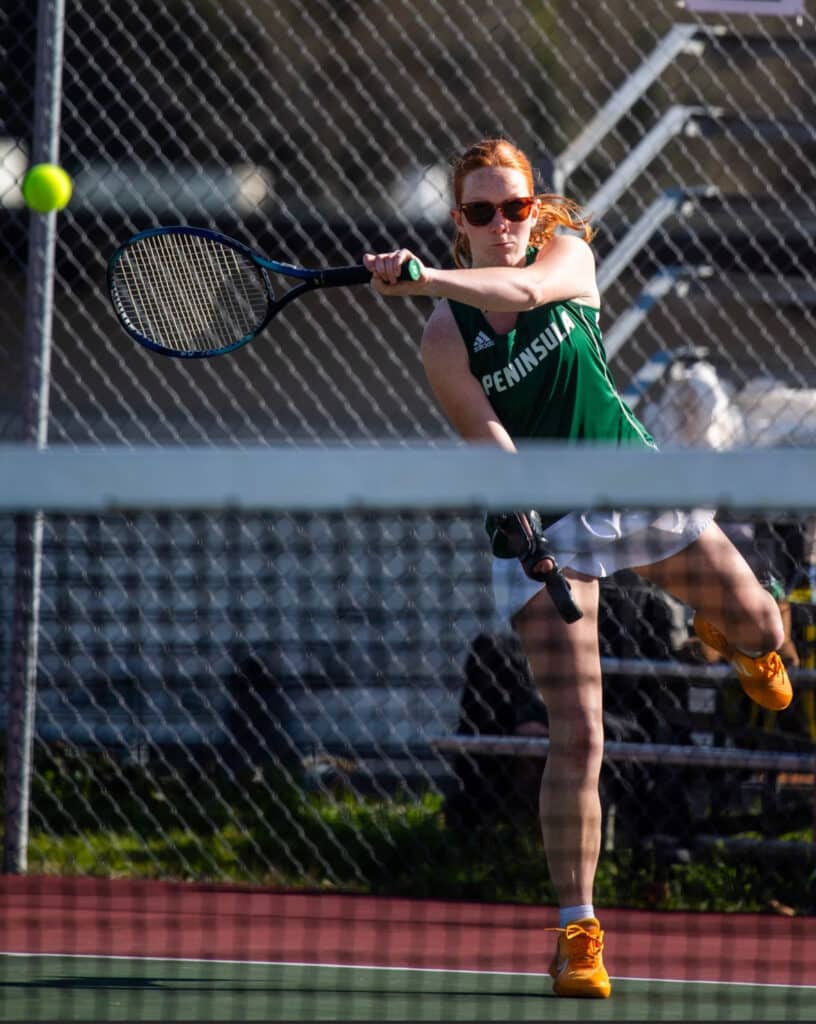Community Sports
Peninsula’s Lindsay Kilcup: ‘I have never looked at it as a disability’
I first noticed Peninsula tennis player Lindsay Kilcup from three courts away during a recent match against Yelm. With multiple players between us, it was the pace of the ball coming off of her racquet and the quickness of her feet that caught my eye.
A few minutes later, her aggressive overhead slam made me change my vantage point and move in for a closer look at Kilcup, the Peninsula captain, and doubles partner Margaux Mayer.
It wasn’t until Kilcup served that I noticed the prosthesis on her right hand.
Kilcup was born without a fully formed right hand, but you would hardly notice from watching her play. She has a formidable serve that starts with her placing the ball in a hook at the end of her prosthesis that looks somewhat like a cup holder. Years of practice allowed her to perfect her ball toss.
Against Yelm, her compact serve consistently found the service box despite a challenging and blustery wind coming off of Henderson Bay.
Multiple players from both teams were patty caking serves just to initiate play. But the cross winds on the Peninsula courts didn’t deter Kilcup as much. She instead delivered a cut serve that sliced over the net, causing her opponent to lunge and hit the ball out.
When it was time for Peninsula to return serve, the point ended when Kilcup anticipated a middle return and raced across the court to smack a un-returnable winner.
She also smacked terms like “handicapped” or “disabled” right out my mind and probably her opponents’ as well. More fitting adjectives like athletic, aggressive, determined and inspirational replaced them.

Lindsay Kilcup talks to Yelm players during a break from a recent match. Photo by Bryce Carithers
Kilcup was born in 2006 to Jon and Beth Kilcup. She has two older siblings, Julia and Owen, and she describes a supportive and nurturing family life in a house full of love.
Asked about his initial reaction in the delivery room on the day she was born, Jon took a deep breath and measured his words.
“My emotions were shock and disbelief as I remember sitting there and thinking, where is God in all of this?” he said. “But he was actually right there in the middle of it all. I’ve always tried to keep a certain perspective on life as humor helps me navigate. After a few minutes I just thought, oh boy, well this is how it is and away we go.”
Jon describes his daughter as a hard charger with a ton of energy. Even when he would want to hold her or give her a hug, she just didn’t want to stay still.
“I’ll never forget sitting and watching her as a little girl teaching herself how to tie her own shoes. We took her to summer camp one year and when we picked her up it was Lindsay who was teaching everyone how to roll up and tie their sleeping bags.”
Kilcup can do it all now: Snow ski, mountain bike, water ski, no problems.
“We have never adjusted life in a way that says you can’t do this or you can’t do that and she’s never asked for any special treatment,” Jon said. “My wife and I are obviously quite proud of her.”
Mayer, her doubles partner, concurs.
“Lindsay is one of the most optimistic and genuinely encouraging people I’ve ever met,” she said. “Her personality is complemented by a competitive drive that not only pushes her to do her best, but encourages me to exceed my capabilities. I am constantly inspired by Lindsay‘s ability to always give 120%.”

Lindsay and Beth Kilcup
Kilcup has a bubbly personality, inborn leadership qualities and brilliant red hair from a distant Scottish heritage. Her voice conveys confidence and optimism, especially when she describes her love for tennis.
Recently I got a chance to talk to Kilcup and ask her some questions about her love of tennis, her faithful supporters, her ability to overcome adversity and her future goals.
Gig Harbir Now: Tell me about your early years in athletics, did you play other sports besides tennis?
Lindsay Kilcup: “Well, I grew up playing soccer which is a very competitive team sport, and I played soccer until my sophomore year. I also joined the tennis team that year and I enjoyed that it was more relaxed and the sport felt less stressful. Because tennis is mostly an individual sport, I kind of got to make it my own rather than having the extreme expectations that soccer sometimes brings. And now tennis has become such a good outlet for me. Every time I play tennis I have so much joy and so much fun.”
GHN: Did you have an early tennis coach?
LK: “Well, my dad played intramural tennis in college and we played it a few times recreationally. I had looked up a couple of tutorials online for ways to serve one handed by putting the ball on the racquet and flipping it up to serve but that was very difficult. My dad suggested my new carbon fiber prosthetic with an attached hook on it. The ball fit perfectly in the hook and enabled me to serve. So I played with him for awhile, got a few pointers and just showed up for tennis tryouts from there.”

A young Lindsay Kilcup sells lemonade from a stand in front of her home. Photo courtesy of Lindsay Kilcup
GHN: I first noticed you on the court because of your ability and what you could do rather than what you couldn’t. Do you view yourself as having a disability?
LK: “No, not at all. The only time I use those type of words is when I am filling out college applications (laughs). I call this my little hand and I have never looked at it as a disability. I’ve always grown up adapting and doing new things because of it. Everything comes pretty naturally to me most of the time.”
GHN: I can see you have managed amazingly well. What advice would you give to a young person that may have similar issues to deal with?
LK: “I would say that you should never stop trying new things because there are so many things that I have had to adapt to and test out. Always keep on trying to find ways to get things done and to make your situation better because if you do, you will find more enjoyment.”
GHN: Tell me about your parents’ approach to your situation and a little bit about how you were raised?
LK: “I wouldn’t say that there were very many times that my little hand created much of a challenge or ever got me really down. My dad has always told me that it’s about how you respond. If something didn’t quite go my way he would always say, ‘It’s how you respond, Lindsay.’ My mom has always been very encouraging and loving to me as well. I am very fortunate to have the parents that I have.”
GHN: What are your goals for this tennis season and tell me a bit about your doubles partner?
LK: “Well our goals are to have a strong showing in league and advance to districts and see what happens from there. We have faced some tough teams in league and have had some very close matches so far but we are consistently getting better. My partner Margaux is a very good communicator and we both give each other some helpful constructive criticism from time to time. Plus with me being a lefty and she being a righty both of our forehands are to the outside which is a big advantage for us.”

Lindsay Kilcup during a match against Yelm. Photo by Bryce Carithers
GHN: Have you ever had moments in matches where you feel your opponents have attacked your backhand or slighted your ability?
LK: “No, not specifically targeted it, but we did have a match this season where I hit a couple good shots in a row and a opponent that may have been a little snarky said ‘oh wow, she hits it pretty hard for only having one hand, I may need to hit it harder too’ as if she wasn’t really trying. That type of stuff really gets me going to play even harder.”
GHN: Tell me about the environment at your high school. It seems like you’ve been supported very well.
LK: “Yes, I have definitely liked playing at Peninsula because I feel like, especially for the tennis team, we have cultivated a polite environment. Coach Cheri (Ausboe) has set a goal for us to be one of the nicer teams in the conference because we feel like we will enjoy the game more, plus it’s 10 times more fun to play that way.”
GHN: How would you describe your personality?
LK: I would say I’m a pretty fun-loving person that is mostly outgoing. I love to find the joy in God’s creations, seeing how he has made people, the earth and other interesting things work. I just want to find and experience all the joy in life.”
GHN: Do you have plans after high school and do you have the grades to pursue your goals in college?
LK: “Yes, I have plans to go to Point Loma Nazarene University in San Diego to study engineering. I have maintained above a 3.8 grade point average throughout high school.”
GHN: How did you decide on an engineering degree?
LK: “I think my little hand has actually helped me out with this a bit. I am always looking for ways to improve things or make processes go faster. I’ve found that it’s a very good skill set of mine. I’m doing running start at (Tacoma Community College) and I have been able to take a couple classes on process improvement and collaborating with people. So far I’ve really enjoyed it.”
GHN: What bothers you the most about an adverse reaction to your hand in public. Have you had specific instances that have come to mind and how do you handle that?
LK: “I think that when I was younger, I struggled a little bit more with how like little kids may react because they were always the most blunt. But now I don’t get bothered unless somebody specifically tells me, they don’t think I can do something because of it. I remember one time at a retreat, there was a rock wall and I love rock climbing but nobody knew that. Somebody told me ‘Hey Lindsay, you’re not going to be able to do this one,’ so I flew up that wall and showed everybody I could rock climb. I kind of like proving somebody wrong if they feel I can’t do something because of my hand.”
GHN: After listening to your responses you seem so grounded and well rounded and have been so successful. I wonder if is it possible that your little hand may have made you an even a better person and finished product. Is that a possibility?
LK: “Wow I’ve never been asked that before, maybe, hopefully…I actually kind of think so! So that’s funny because my parents used to always tell me: ‘Lindsay, God made you with a little hand just so that everybody else could keep up.’ ”
